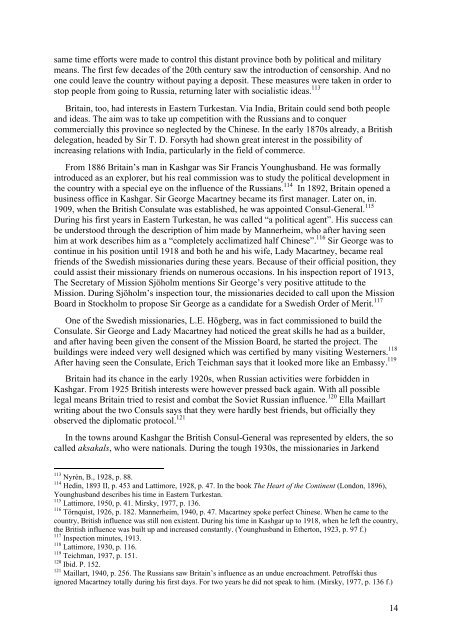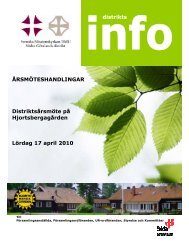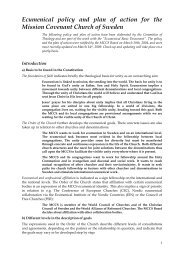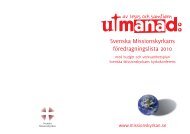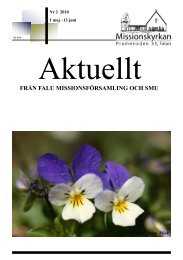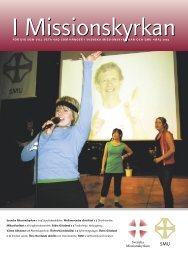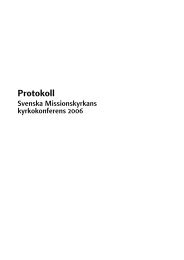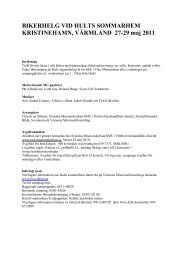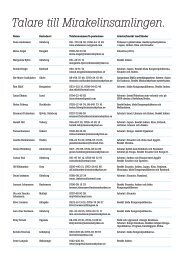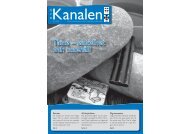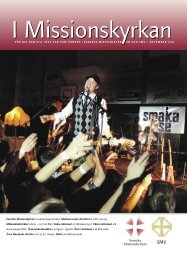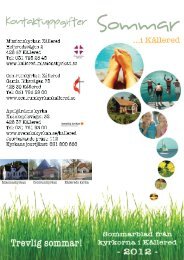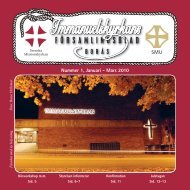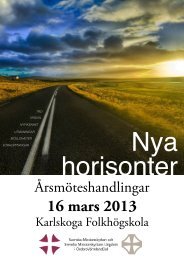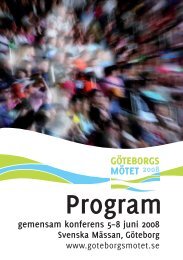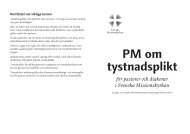Mission and Revolution in Central Asia - Svenska Missionskyrkan
Mission and Revolution in Central Asia - Svenska Missionskyrkan
Mission and Revolution in Central Asia - Svenska Missionskyrkan
Create successful ePaper yourself
Turn your PDF publications into a flip-book with our unique Google optimized e-Paper software.
same time efforts were made to control this distant prov<strong>in</strong>ce both by political <strong>and</strong> military<br />
means. The first few decades of the 20th century saw the <strong>in</strong>troduction of censorship. And no<br />
one could leave the country without pay<strong>in</strong>g a deposit. These measures were taken <strong>in</strong> order to<br />
stop people from go<strong>in</strong>g to Russia, return<strong>in</strong>g later with socialistic ideas. 113<br />
Brita<strong>in</strong>, too, had <strong>in</strong>terests <strong>in</strong> Eastern Turkestan. Via India, Brita<strong>in</strong> could send both people<br />
<strong>and</strong> ideas. The aim was to take up competition with the Russians <strong>and</strong> to conquer<br />
commercially this prov<strong>in</strong>ce so neglected by the Ch<strong>in</strong>ese. In the early 1870s already, a British<br />
delegation, headed by Sir T. D. Forsyth had shown great <strong>in</strong>terest <strong>in</strong> the possibility of<br />
<strong>in</strong>creas<strong>in</strong>g relations with India, particularly <strong>in</strong> the field of commerce.<br />
From 1886 Brita<strong>in</strong>’s man <strong>in</strong> Kashgar was Sir Francis Younghusb<strong>and</strong>. He was formally<br />
<strong>in</strong>troduced as an explorer, but his real commission was to study the political development <strong>in</strong><br />
the country with a special eye on the <strong>in</strong>fluence of the Russians. 114 In 1892, Brita<strong>in</strong> opened a<br />
bus<strong>in</strong>ess office <strong>in</strong> Kashgar. Sir George Macartney became its first manager. Later on, <strong>in</strong>.<br />
1909, when the British Consulate was established, he was appo<strong>in</strong>ted Consul-General. 115<br />
Dur<strong>in</strong>g his first years <strong>in</strong> Eastern Turkestan, he was called “a political agent”. His success can<br />
be understood through the description of him made by Mannerheim, who after hav<strong>in</strong>g seen<br />
him at work describes him as a “completely acclimatized half Ch<strong>in</strong>ese”. 116 Sir George was to<br />
cont<strong>in</strong>ue <strong>in</strong> his position until 1918 <strong>and</strong> both he <strong>and</strong> his wife, Lady Macartney, became real<br />
friends of the Swedish missionaries dur<strong>in</strong>g these years. Because of their official position, they<br />
could assist their missionary friends on numerous occasions. In his <strong>in</strong>spection report of 1913,<br />
The Secretary of <strong>Mission</strong> Sjöholm mentions Sir George’s very positive attitude to the<br />
<strong>Mission</strong>. Dur<strong>in</strong>g Sjöholm’s <strong>in</strong>spection tour, the missionaries decided to call upon the <strong>Mission</strong><br />
Board <strong>in</strong> Stockholm to propose Sir George as a c<strong>and</strong>idate for a Swedish Order of Merit. 117<br />
One of the Swedish missionaries, L.E. Högberg, was <strong>in</strong> fact commissioned to build the<br />
Consulate. Sir George <strong>and</strong> Lady Macartney had noticed the great skills he had as a builder,<br />
<strong>and</strong> after hav<strong>in</strong>g been given the consent of the <strong>Mission</strong> Board, he started the project. The<br />
build<strong>in</strong>gs were <strong>in</strong>deed very well designed which was certified by many visit<strong>in</strong>g Westerners. 118<br />
After hav<strong>in</strong>g seen the Consulate, Erich Teichman says that it looked more like an Embassy. 119<br />
Brita<strong>in</strong> had its chance <strong>in</strong> the early 1920s, when Russian activities were forbidden <strong>in</strong><br />
Kashgar. From 1925 British <strong>in</strong>terests were however pressed back aga<strong>in</strong>. With all possible<br />
legal means Brita<strong>in</strong> tried to resist <strong>and</strong> combat the Soviet Russian <strong>in</strong>fluence. 120 Ella Maillart<br />
writ<strong>in</strong>g about the two Consuls says that they were hardly best friends, but officially they<br />
observed the diplomatic protocol. 121<br />
In the towns around Kashgar the British Consul-General was represented by elders, the so<br />
called aksakals, who were nationals. Dur<strong>in</strong>g the tough 1930s, the missionaries <strong>in</strong> Jarkend<br />
113<br />
Nyrén, B., 1928, p. 88.<br />
114<br />
Hed<strong>in</strong>, 1893 II, p. 453 <strong>and</strong> Lattimore, 1928, p. 47. In the book The Heart of the Cont<strong>in</strong>ent (London, 1896),<br />
Younghusb<strong>and</strong> describes his time <strong>in</strong> Eastern Turkestan.<br />
115<br />
Lattimore, 1950, p. 41. Mirsky, 1977, p. 136.<br />
116<br />
Törnquist, 1926, p. 182. Mannerheim, 1940, p. 47. Macartney spoke perfect Ch<strong>in</strong>ese. When he came to the<br />
country, British <strong>in</strong>fluence was still non existent. Dur<strong>in</strong>g his time <strong>in</strong> Kashgar up to 1918, when he left the country,<br />
the British <strong>in</strong>fluence was built up <strong>and</strong> <strong>in</strong>creased constantly. (Younghusb<strong>and</strong> <strong>in</strong> Etherton, 1923, p. 97 f.)<br />
117<br />
Inspection m<strong>in</strong>utes, 1913.<br />
118<br />
Lattimore, 1930, p. 116.<br />
119<br />
Teichman, 1937, p. 151.<br />
120<br />
Ibid. P. 152.<br />
121<br />
Maillart, 1940, p. 256. The Russians saw Brita<strong>in</strong>’s <strong>in</strong>fluence as an undue encroachment. Petroffski thus<br />
ignored Macartney totally dur<strong>in</strong>g his first days. For two years he did not speak to him. (Mirsky, 1977, p. 136 f.)<br />
14


